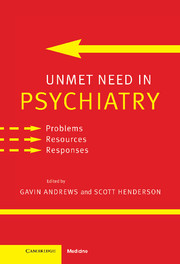Book contents
- Frontmatter
- Contents
- List of Contributors
- Preface
- Part I Unmet need: defining the problem
- Part II Unmet need: general problems and solutions
- Part III Unmet need: people with specific disorders
- Introduction
- 13 The unmet needs of people suffering from schizophrenia
- 14 The early course of schizophrenia: new concepts for early intervention
- 15 Unmet need in depression: varying perspectives on need
- 16 Unmet need following serious suicide attempt: follow-up of 302 individuals for 30 months
- 17 Met and unmet need for interventions in community cases with anxiety disorders
- 18 The unmet need for treatment in panic disorder and social phobia
- 19 Alcohol-use disorders: who should be treated and how?
- 20 Putting epidemiology and public health in needs assessment: drug dependence and beyond
- 21 Why are somatoform disorders so poorly recognized and treated?
- Part IV Unmet need: specific issues
- Part V Unmet need: conclusion
- Index
19 - Alcohol-use disorders: who should be treated and how?
from Part III - Unmet need: people with specific disorders
Published online by Cambridge University Press: 21 August 2009
- Frontmatter
- Contents
- List of Contributors
- Preface
- Part I Unmet need: defining the problem
- Part II Unmet need: general problems and solutions
- Part III Unmet need: people with specific disorders
- Introduction
- 13 The unmet needs of people suffering from schizophrenia
- 14 The early course of schizophrenia: new concepts for early intervention
- 15 Unmet need in depression: varying perspectives on need
- 16 Unmet need following serious suicide attempt: follow-up of 302 individuals for 30 months
- 17 Met and unmet need for interventions in community cases with anxiety disorders
- 18 The unmet need for treatment in panic disorder and social phobia
- 19 Alcohol-use disorders: who should be treated and how?
- 20 Putting epidemiology and public health in needs assessment: drug dependence and beyond
- 21 Why are somatoform disorders so poorly recognized and treated?
- Part IV Unmet need: specific issues
- Part V Unmet need: conclusion
- Index
Summary
Summary
Alcohol-use disorders are among the more prevalent mental disorders diagnosed in community surveys, yet only a small proportion of people with alcohol-use disorders seek or receive treatment from mental health or addiction treatment services. Although it is tempting to assume that these disorders are undertreated, treatment may not always be appropriate, since approximately half of the disorders detected in population surveys will remit without formal treatment. If not everyone with an alcohol-use disorder needs treatment, how should we deploy limited treatment resources to produce the greatest reduction in alcohol-related harm?
Public education about the risks of alcohol use may prevent and ameliorate the significant public health consequences of the prevalent, milder alcoholuse disorders. Education about self-help strategies for quitting or cutting down may obviate the need for professional assistance. Those whose problems resist self-help need more effective forms of treatment, more efficiently delivered than is often the case at present. Treatment services appear to routinely provide the most expensive, intensive and least effective forms of intervention to persons who present with alcohol-use disorders. Better triage would ensure a more rational use of scarce treatment resources.
Given the high rates of comorbidity between alcohol-use, anxiety, and affective disorders, the treatment of people with comorbid mental and alcohol-use disorders must be improved. Specialist mental health services need to recognize and treat comorbid alcohol-use disorders among their patients. Specialist alcohol treatment services need to give priority to better identification and management of anxiety and affective disorders among their patients since these are the mental disorders that are most prevalent and the most amenable to treatment.
Keywords
- Type
- Chapter
- Information
- Unmet Need in PsychiatryProblems, Resources, Responses, pp. 290 - 301Publisher: Cambridge University PressPrint publication year: 2000
- 2
- Cited by

